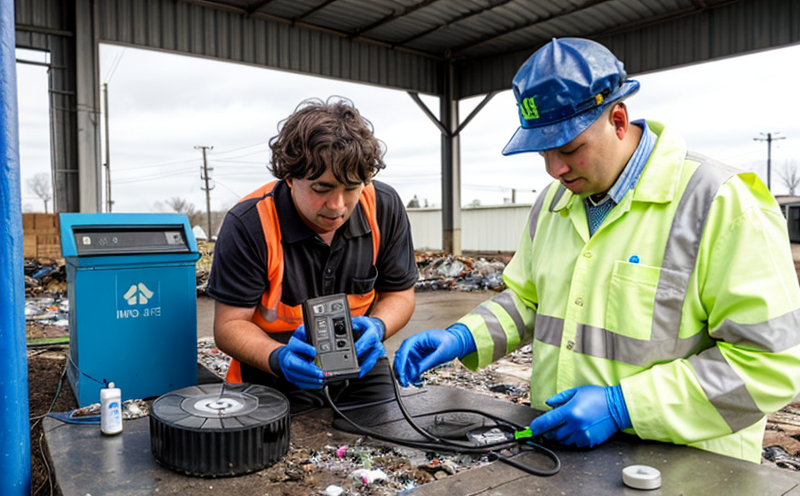DIN EN 12457 Leaching Test for Hazardous Components in E-Waste
The DIN EN 12457 leaching test is a crucial procedure designed to assess the hazardous components present within electronic waste (e-waste). This test ensures that manufacturers, recyclers, and regulators can accurately identify and mitigate potential environmental risks associated with e-waste. The standard outlines a stringent methodology for simulating real-world conditions under which hazardous materials may be released into the environment.
The leaching process involves subjecting a sample of e-waste to controlled chemical or physical treatments that mimic typical recycling processes. These conditions are designed to simulate scenarios where waste is improperly managed, potentially leading to harmful substances entering the soil and water systems. By conducting this test, stakeholders can ensure compliance with international regulations aimed at protecting human health and the environment.
The procedure involves several critical steps: specimen preparation, leaching solution selection, incubation period, pH control, temperature regulation, and subsequent analysis of released materials. Specimen preparation must account for various types of e-waste, including circuit boards, batteries, and other components containing hazardous substances such as lead, mercury, cadmium, and brominated flame retardants.
The leaching solution is typically a buffered aqueous solution that mimics the conditions found in landfills or recycling processes. The incubation period allows for the release of harmful elements from the waste material into the solution. pH control ensures optimal reaction rates, while temperature regulation maintains consistent environmental conditions throughout the process.
Following the incubation period, samples are analyzed using various analytical techniques such as atomic absorption spectroscopy (AAS) and inductively coupled plasma mass spectrometry (ICP-MS). These methods provide precise quantification of hazardous components present in the leachate. Compliance with DIN EN 12457 ensures that waste management practices align with international standards, enhancing environmental protection.
The test not only aids in compliance but also supports continuous improvement in recycling processes by identifying areas where improvements can be made to reduce harmful emissions and prevent contamination of natural resources. This service is essential for industries dealing with e-waste, ensuring sustainable operations that meet regulatory requirements and promote a cleaner environment.
Eurolab Advantages
At Eurolab, we offer comprehensive DIN EN 12457 leaching tests tailored to the needs of our clients. Our state-of-the-art facilities are equipped with advanced instrumentation and expertise in handling hazardous materials safely and effectively.
- Accurate Testing: We use precise analytical techniques such as AAS and ICP-MS to ensure accurate measurement of released hazardous components.
- Comprehensive Support: Our team provides detailed reports and recommendations based on test results, helping clients make informed decisions about waste management practices.
- Regulatory Compliance: Eurolab ensures that all tests are conducted in accordance with the latest international standards, providing peace of mind for our customers.
- Sustainability Focus: We prioritize sustainable solutions and continuous improvement in waste management processes to contribute positively to environmental sustainability.
Our commitment to excellence, combined with our extensive experience in the field, makes Eurolab the preferred choice for high-quality e-waste leaching tests. Contact us today to learn more about how we can assist you in achieving compliance and sustainability goals.
Environmental and Sustainability Contributions
The DIN EN 12457 leaching test plays a vital role in enhancing environmental protection by identifying hazardous components released during the recycling of e-waste. By conducting these tests, we help prevent contamination of soil and water resources, which is critical for maintaining ecological balance.
Our services contribute significantly to the circular economy by promoting sustainable waste management practices. By ensuring compliance with international standards, we encourage responsible recycling processes that minimize environmental impact. This not only benefits the immediate environment but also supports long-term sustainability goals.
The data obtained from these tests can be used to develop more efficient and environmentally friendly methods for handling e-waste. This information is invaluable for manufacturers, recyclers, and regulators who are committed to reducing their carbon footprint and promoting sustainable practices.
Through our testing services, Eurolab supports the transition towards a greener future by offering reliable data that can guide decision-making processes in waste management. We believe that every effort counts in our collective journey towards environmental stewardship.
Competitive Advantage and Market Impact
The DIN EN 12457 leaching test is a key differentiator for Eurolab, providing clients with the assurance of accurate and reliable testing that meets international standards. This service is particularly valuable for companies in the electronics and recycling sectors who are committed to environmental responsibility.
By offering these tests, we help our clients stay ahead of regulatory changes and industry trends, ensuring they maintain a competitive edge in an increasingly environmentally conscious market. Our expertise in this area allows us to provide insights that can drive innovation within their organizations.
The data generated from our testing services is highly regarded by both internal teams and external stakeholders, including regulators and customers. This reputation for quality and reliability enhances the overall brand image of our clients, contributing to their success in the market.
Furthermore, compliance with international standards not only ensures legal adherence but also fosters trust among consumers who are increasingly aware of environmental issues. By demonstrating a commitment to sustainability through rigorous testing, Eurolab helps its clients build strong reputations as leaders in responsible waste management and recycling practices.





